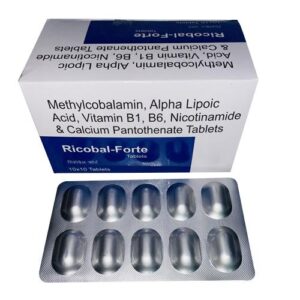THIAMINE
THIAMINE: Thiamine, also known as Vitamin B1, is a water-soluble vitamin that plays a crucial role in the body’s energy metabolism and nerve function. It is an essential coenzyme that helps convert carbohydrates into energy and is involved in the synthesis of neurotransmitters.
Thiamine is primarily used to treat and prevent vitamin B1 deficiency, which can occur due to poor nutrition, alcoholism, or certain medical conditions. It is also prescribed for individuals with alcohol withdrawal syndrome and other alcohol-related disorders.
Thiamine exerts its therapeutic effects by serving as a cofactor in several important enzymatic reactions in the body. It is involved in the oxidative decarboxylation of pyruvate and alpha-ketoglutarate, key steps in the Krebs cycle, which produces cellular energy. Thiamine also facilitates the synthesis of neurotransmitters such as acetylcholine and gamma-aminobutyric acid (GABA), which are essential for proper nerve function.
The dosage of thiamine varies depending on the individual’s age, condition, and specific needs. For adults, the usual recommended daily dose is 1.2 mg to 1.5 mg orally. In cases of severe deficiency or certain medical conditions, higher doses may be necessary under medical supervision.
Thiamine is generally considered safe when taken orally in recommended doses. However, high-dose thiamine injections can cause local irritation and inflammation at the injection site. Rarely, anaphylactic reactions may occur in susceptible individuals. Allergic reactions to thiamine are extremely rare.
There are no known significant drug interactions with thiamine.
Overall, thiamine is a vital nutrient for proper energy metabolism and nerve function. Its deficiency can lead to serious health issues, and supplementation with thiamine can help prevent and treat vitamin B1 deficiency. It is important to consult a healthcare professional or a registered dietitian before starting any new medication or dietary supplement.

